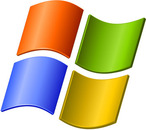Microsoft Releases Windows Server ‘8’ Beta & SQL Server 2012 RTM
Microsoft has just released Windows Server ‘8’ Beta to try for free and SQL Server RTM for purchase or evaluation. Windows Server ‘8’ succeeds Server 2008 R2 and while we haven’t had a chance to try it yet, it’s expected to have a superset of the functionality of Windows 8, in a similar way that its predecessors were supersets of their respective client versions. Also, we doubt that the tablet-oriented Metro interface will be front and centre like it is on Windows 8, since server operating systems aren’t designed to run on tablets.
The server OS will focus heavily on virtualization and the cloud. It’s the first operating system to fully integrate the virtualization features which first appeared in Windows 7 & R2. It’s also geared towards building and distributing desktop and mobile apps. Finally, Microsoft make a big claim about stability/resilience to failure, saying that it will not crash, even when major services fall over. We feel that keeping one’s skeptical hat on is in order for this one, until it proves itself. Note the ‘8’ in the name denotes a working title rather than a final product name. Retail availability is expected this year.
Then we have SQL Server 2012. This is the world’s number one used server in the world and Microsoft have made many improvements to it in this new version. Again, the key benefit is assurance of “uptime no matter what” for Windows Server ‘8’ and SQL Server, with its AlwaysOn feature.

SQL Server 2012 key features:
- Deliver required uptime and data protection with AlwaysOn
- Gain breakthrough & predictable performance with ColumnStore Index
- Help enable security and compliance with new User-defined Roles and Default Schema for Groups
- Enable rapid data discovery for deeper insights across the organization with ColumnStore Index
- Ensure more credible, consistent data with SSIS improvements, a Master Data Services add-in for Excel, and new Data Quality Services
- Optimize IT and developer productivity across server and cloud with Data-tier Application Component (DAC) parity with SQL Azure and SQL Server Data Tools for a unified dev experience across database, BI, and cloud functions

Comments are closed.